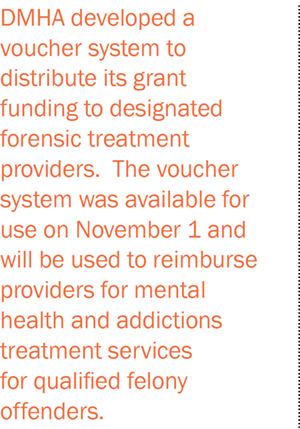 The Indiana General Assembly focused on criminal code reform during the 2014 and 2015 legislative sessions. House Enrolled Act (HEA) 1006, authored both years by Representative Greg Steuerwald, R-Avon, rewrote criminal penalties and sentencing statutes to keep low-level offenders in local communities where they will have better access to mental health and substance abuse treatment, as well as rehabilitation programming. January 1, 2016 is the effective date of the sentencing changes in which the majority of individuals convicted of low-level drug and property crimes will no longer be sent to the Department of Correction.
The Indiana General Assembly focused on criminal code reform during the 2014 and 2015 legislative sessions. House Enrolled Act (HEA) 1006, authored both years by Representative Greg Steuerwald, R-Avon, rewrote criminal penalties and sentencing statutes to keep low-level offenders in local communities where they will have better access to mental health and substance abuse treatment, as well as rehabilitation programming. January 1, 2016 is the effective date of the sentencing changes in which the majority of individuals convicted of low-level drug and property crimes will no longer be sent to the Department of Correction.
To help counties prepare for the increase in Level 6 felony offenders statewide that will remain in local communities each year, the General Assembly set aside $55 million in the state budget to fund grant programs over the next two years. A Level 6 felony is the lowest level of felony in Indiana. It carries a penalty upon conviction of a fixed term between six (6) months and two and one half (2 1/2) years in prison and a fine of up to $10,000.00.
The grant funding is divided between the Department of Correction’s (DOC) community corrections program and the Family and Social Services Administration’s Division of Mental Health and Addiction (DMHA).
 DOC received $5 million for Fiscal Year (FY) 2016 and $20 million for FY 2017, which is available for evidence-based programs and technology-based programs for moderate and high-risk felony offenders on community supervision. DMHA received $10 million in FY 2016 and $20 million in FY 2017, which is available for evidence-based mental health and addictions treatment and wrap-around services for individuals with a felony conviction.
DOC received $5 million for Fiscal Year (FY) 2016 and $20 million for FY 2017, which is available for evidence-based programs and technology-based programs for moderate and high-risk felony offenders on community supervision. DMHA received $10 million in FY 2016 and $20 million in FY 2017, which is available for evidence-based mental health and addictions treatment and wrap-around services for individuals with a felony conviction.
HEA 1006 also created the Justice Reinvestment Advisory Council. The Advisory Council will conduct a state level review and evaluation of local corrections programs and the processes used by DOC and DMHA in awarding grants. The Advisory Council also makes recommendations to DOC and DMHA concerning the award of grants. The members of the Advisory Council are: Chair, Jane Seigel (Executive Director of the Indiana Judicial Center), Larry Landis (Executive Director of the Indiana Public Defender Council), David Powell (Executive Director of the Indiana Prosecuting Attorneys Council), Kevin Moore (Director of the Division of Mental Health and Addiction), Jerry Harbstreit (President of the Indiana Sheriffs Association), Bruce Lemmon (Commissioner of the Department of Correction), David Murtaugh (Executive Director of the Indiana Criminal Justice Institute), Chris Cunningham (President of the Indiana Association of Community Corrections Act Counties) and Linda Brady (President of the Probation Officers Professional Association of Indiana). The Judicial Center serves as staff to the Advisory Council.
Community corrections programs, probation departments, court recidivism reduction programs, and prosecutor diversion programs, through a collaborative effort, are eligible to apply for DOC grant funds. Sixty applications, representing 70 counties, were submitted to DOC requesting $17.4 million for FY 2016. The Advisory Council will make funding recommendations to DOC Commissioner Bruce Lemmon. The Advisory Council plans to publish the grant applications for DOC FY 2017 funding in December.
DMHA developed a voucher system to distribute its grant funding to designated forensic treatment providers. The voucher system was available for use on November 1 and will be used to reimburse providers for mental health and addictions treatment services for qualified felony offenders.
Kevin Moore, Director of DMHA, announced to the Advisory Council in September that the voucher system will be known as “Recovery Works”. DMHA and the Advisory Council plan to monitor the location of designated forensic treatment providers to identify gaps in treatment services. Agencies that receive DOC or DMHA funding will be required to report recidivism rates of participants and overall success rates of programs. In addition, DOC, DMHA and the Advisory Council will oversee funded programs to ensure adherence to evidence-based practices, collaboration with criminal justice partners and avoidance of service duplication.
Additional information on the Justice Reinvestment Advisory Council and the DOC and DMHA funding opportunities is available on the IJC website at: courts.in.gov/center.